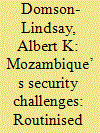| Srl | Item |
| 1 |
ID:
185508


|
|
|
|
|
| Summary/Abstract |
The ongoing security crisis in Mozambique reveals the limitations of the mainstream statist approach to security promotion. Whenever there is social conflict or unrest, state authorities instinctively and routinely rely on military means to deal with it. However, this approach disregards the root causes of the problem, which are often the internal social, political and economic triggers of insecurity. Presently there are international security actors assisting the Mozambican government in dealing with the armed conflict in their country. As a contribution to the emerging body of work on Mozambique’s security challenges beginning in 1990, this paper adopts a critical security perspective in the analysis of the problem. The view is taken that there ought to be a balanced or broader approach to security. Although a military response is necessary for combating hostile forces, this effort should go in tandem with addressing the fundamental causes of the crisis. The paper argues that in Mozambique poor governance in the form of corruption, political patronage, marginalisation of minority groups, centralisation of power and other exclusionary practices are the major sources of the country’s insecurity. Some proposals are suggested to address these challenges.
|
|
|
|
|
|
|
|
|
|
|
|
|
|
|
|
| 2 |
ID:
107324


|
|
|
|
|
| Publication |
2011.
|
| Summary/Abstract |
Political violence, at times perceived as terrorism, remains a major security challenge in Swaziland. The common view is that this violence is perpetrated by those who feel marginalised from the political process. Central to the hypothesis advanced in this paper is that any effective solution to the menace of political violence and the security challenges it poses begins with an awareness of the symbiotic relation between security, human rights and democracy. It has been empirically proven that abuse of human rights can lead to violence, which negates peace and security in any society. In terms of content the paper looks at the shape of political violence in Swaziland. Next, it discusses the strategies and ideas behind efforts by the Swazi state to combat political violence and the counter-arguments. The final section shows the inextricable link between security, human rights and democracy; and argues that recognising this linkage can provide the key to unlocking the security puzzle in Swaziland.
|
|
|
|
|
|
|
|
|
|
|
|
|
|
|
|